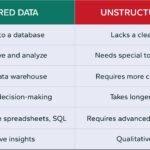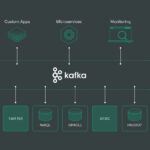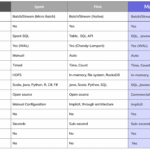In the realm of Big Data, where large volumes of data are constantly being generated and analyzed, ensuring data resilience is paramount. Multi-cloud data replication plays a crucial role in safeguarding this valuable data in the event of failures or disasters. By distributing data across multiple cloud environments, organizations can enhance their resilience to potential disruptions and failures, thus minimizing the risk of data loss. This proactive approach not only mitigates the potential impact of downtime but also contributes to the overall robustness and reliability of a Big Data infrastructure. In this article, we will delve deeper into the importance of multi-cloud data replication for Big Data resilience and explore the key benefits it offers in ensuring data availability and integrity.
Understanding Multi-Cloud Strategies
In today’s digital landscape, businesses are increasingly adopting multi-cloud strategies to improve their IT infrastructure. This approach offers flexibility, scalability, and enhanced performance. By leveraging multiple cloud service providers, organizations can optimize their resources while minimizing reliance on a single platform. The rise of big data amplifies the need for robust data management practices, making multi-cloud data replication an essential component of preserving data resilience.
What is Multi-Cloud Data Replication?
Multi-cloud data replication involves duplicating data across various cloud environments. This strategy ensures that data is consistently backed up and available in different geographical locations. By diversifying data storage solutions and leveraging different cloud environments, businesses can mitigate risks associated with data loss, downtime, and infrastructure failures.
The Role of Big Data in Business Decisions
Big data has transformed how organizations collect, analyze, and utilize information. As more businesses rely on data-driven insights, the volume of data generated continues to grow exponentially. This growing reliance on big data makes it crucial for organizations to ensure that their data is not only available but also resilient against failures and breaches.
The Need for Resilience in Big Data
Data resilience refers to the ability of an organization to recover data and maintain operations in the face of disruptions, such as natural disasters, hardware failures, or cyberattacks. With the increasing value placed on data, underestimating the importance of data resilience can lead to catastrophic failures, including:
- Financial Losses: Data breaches and outages can cost businesses millions of dollars.
- Reputation Damage: Organizations that suffer data loss may lose customer trust and face negative publicity.
- Regulatory Consequences: Non-compliance with data protection regulations can result in hefty fines.
Enhancing Data Availability through Multi-Cloud Data Replication
One of the primary benefits of implementing a multi-cloud data replication strategy is enhanced data availability. Businesses that replicate their data across multiple clouds can ensure that they have immediate access to information, regardless of any disruptions in one specific location. This capability is particularly crucial in industries reliant on real-time data for decision-making.
Redundancy and Disaster Recovery
Another significant aspect of multi-cloud data replication is redundancy, which is vital for disaster recovery planning. By distributing data across different cloud environments, organizations can create a safety net for their information assets. In the event of a catastrophic failure, such as a data center going offline, businesses can quickly restore operations by switching to another cloud provider that hosts a replica of their data.
Cost Efficiency Through Multi-Cloud Environments
Although some may view multi-cloud strategies as an unnecessary expense, they can lead to significant cost savings in the long run. By integrating different cloud services, organizations can choose the most cost-effective solutions tailored for specific workloads. This flexibility can handle big data without incurring excessive costs, ensuring that data replication processes remain economically viable.
Compliance and Data Governance
Data compliance is essential for companies operating in regulated industries. Different regions have varying laws and regulations regarding data storage and privacy, making it imperative for businesses to follow compliance protocols. Multi-cloud data replication allows organizations to adhere to local data governance standards by storing copies of data in specific geographical locations. This capability helps ensure that businesses remain compliant while optimizing data access and security.
Optimizing Big Data Analytics with Multi-Cloud Replication
Organizations relying on big data analytics can derive significant benefits from multi-cloud data replication. By replicating data across multiple cloud sources, businesses can access and analyze vast data sets from diverse environments. This integrative approach enables more comprehensive insights, particularly when conducting comparative analyses and identifying trends across different data landscapes.
Security Enhancements via Data Replication
As cyber threats continue to evolve, protecting sensitive data is of utmost importance. Multi-cloud data replication can enhance security by ensuring that data is not stored in a single vulnerable location. By spreading data across multiple environments, the risk of exposure to cyberattacks can be significantly reduced. Furthermore, many cloud providers incorporate advanced security measures, such as encryption and access controls, adding an additional layer of protection for replicated data.
Maintaining Operational Continuity
Operational continuity is critical for maintaining the health of any organization. Multi-cloud data replication plays a vital role in this area by enabling businesses to quickly recover from system failures or outages. With data continuously replicated across various cloud platforms, operations can continue seamlessly, ensuring that employees, stakeholders, and customers experience minimal disruptions.
Challenges of Multi-Cloud Data Replication
While the advantages of multi-cloud data replication are substantial, organizations must also navigate certain challenges:
- Complexity: Managing multiple cloud environments can be complex and may require specialized skills.
- Cost Management: While it can be cost-effective, hidden costs associated with data transfer and storage must be monitored.
- Integration Issues: Systems might face interoperability challenges when communicating across different cloud platforms.
Best Practices for Implementing Multi-Cloud Data Replication
To successfully implement a multi-cloud data replication strategy, organizations should adhere to the following best practices:
- Assess Business Needs: Understand the specific data requirements and risks to tailor a suitable replication strategy.
- Select the Right Cloud Providers: Choose providers that align with organizational goals, offering the best features for big data needs.
- Implement Strong Security Protocols: Ensure that data is protected during replication with robust encryption and access controls.
- Regularly Test Backup and Recovery Processes: Conduct periodic tests to validate the effectiveness of data backup and recovery mechanisms.
- Monitor Performance and Costs: Continuously analyze data replication processes to optimize performance and manage expenses effectively.
The Future of Multi-Cloud Data Replication and Big Data
The future of multi-cloud data replication looks promising as organizations increasingly recognize the importance of big data resilience. With the ongoing advancements in cloud technologies, capabilities such as automated replication, AI-driven analytics, and enhanced security features will evolve and provide businesses with even more robust data management solutions.
As data continues to play a critical role in business strategy, investing in multi-cloud data replication will be crucial for forging a resilient data landscape that can withstand disruptions and capitalize on opportunities presented by big data.
Implementing multi-cloud data replication is crucial for enhancing Big Data resilience by ensuring data availability, reliability, and disaster recovery capabilities. By leveraging multiple cloud providers, organizations can mitigate the risks of data loss and downtime, and effectively safeguard their data assets in the rapidly evolving landscape of Big Data technologies.














